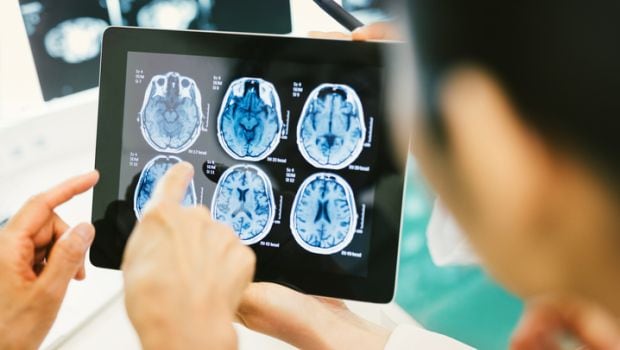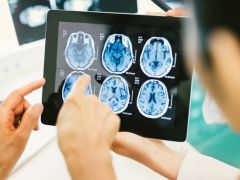A brain tumor occurs when abnormal cells form within the brain or the central spine that disrupts proper brain function and can also be life threatening.

A brain tumor is a collection, or mass, of abnormal cells in your brain
The International Association of Cancer Registries (IARC) reported that there are over 28,000 cases of brain tumors reported in India and over 24,000 people reportedly die due to brain tumors annually. A brain tumor occurs when abnormal cells form within the brain or the central spine that disrupts proper brain function and can also be life threatening. They are of two types - cancerous (malignant) and noncancerous (benign). In fact, different types of brain tumors are categorized by size, location, cell origin, and degree. Brain tumor statistics are classified in research reports as tumors of the brain and the central nervous system (CNS). Benign brain tumors are slow-growing tumors that can be removed or destroyed in an easily accessible location. Malignant tumors, or brain tumors, are fast-growing tumors that invade, infiltrate and destroy normal brain tissue.
Brain tumor: Causes, risk factors and treatment
People who have been exposed to ionizing radiation such as radio therapy which is used to treat cancer or radiation exposure caused by atomic bonds have an increased risk of being diagnosed with brain tumor. Being exposed to certain chemicals in the work environment can also increase the risk of brain tumor among individuals.
Individuals having a family history of brain tumors or any kind of genetic syndromes also has a minor risk of getting brain tumor. Also, being overweight or obese may be tied to an increased risk of a type of brain tumor called meningioma. This is according to a new meta-analysis published in the online issue of Neurology, the medical journal of the American Academy of Neurology.
Individuals with HIV/AIDS have an increased risk of developing a type of brain tumor called a CNS lymphoma. Even though the reason is not completely known, but it is most likely related to the weakening of the immune system, particularly in the later stages of the disease.
Also, there are studies which shows that chances of brain tumor are slightly higher in women than men; people above the age of 70 years and individuals having previous cases of cancer (childhood brain and other solid tumors, leukemia, melanoma, thyroid or prostate cancers).
Also read: Are Extreme Headaches Sign of Brain Tumour?
Available treatments
In recent years, there have been several developments in the treatments for brain tumor so as to make it as minimally invasive as possible. Doctors use cortical mapping and imaging techniques to map the location of the tumor and perform the surgery with meticulous planning.
The treatment options depends on several factors such as the size, type, and grade of the tumor; if it has spread to other parts of the body or the central nervous system; if it is applying pressure on vital parts of the brain and the possible side effects and preferences of the individuals.
The usual treatment for brain tumor includes the options for surgery, radiation therapy, chemotherapy, and targeted therapy.
Endoscopic brain tumor surgery is a minimally invasive treatment procedure that enables neurosurgeons to find and treat the disease in the deep brain by accessing it through the nose. Brain tumor surgeries in India provide tissue samples for biopsy analysis to remove the tumor.
Radiotherapy for brain tumors destroys the cancer cells in the brain by releasing high-energy X-rays. External radiotherapy is used to treat brain tumors, and the radiation from the brain tumor is administered to the body using a machine.
Systemic therapy is the use of medication to destroy tumor cells. The medication here is given through the bloodstream of patients to reach the tumor cells throughout the body system.
The types of systemic therapies used for brain tumors include chemotherapy and targeted therapy. Chemotherapy is typically given after surgery and possibly with or after radiation therapy, particularly if the tumor has come back after initial treatment.
In addition to standard chemotherapy, targeted therapy is a treatment that targets the tumor's specific genes, proteins, or the tissue environment that contributes to a tumor's growth and survival. This type of treatment blocks the growth and spread of tumor cells and limits the damage to healthy cells.
In medicine, ozone has been used for therapeutic treatments. The ozone molecule is unstable and is an active and reactive form of oxygen. This oxygen molecule purifies the blood, lymph, and other body tissues by combining quickly with them. The process through which ozone-oxygen gas is administered into the body to treat a disease or a wound is known as Ozone therapy. It is an alternative adjuvant medical treatment that introduces ozone or ozonides to the body and is used to treat medical conditions as it stimulates the immune system and is also used for disinfection. Ozone Therapy stimulates adaptive mechanisms that induce modulations in the patients by affecting the immune system, blood flow and oxygenation, and oxidative stress. It provides more oxygen to the red blood cells and increases the body's glucose uptake, hence giving more energy. Ozone therapy is also known to make the cell membranes more healthy, elastic, and pliable while also increasing the cell's nutrient intake. The therapy is a powerful oxidant and stimulates the antioxidant enzymes, and promotes a preconditioning effect or adaptability to oxidative stress.
Disclaimer: The opinions expressed within this article are the personal opinions of the author. NDTV is not responsible for the accuracy, completeness, suitability, or validity of any information on this article. All information is provided on an as-is basis. The information, facts or opinions appearing in the article do not reflect the views of NDTV and NDTV does not assume any responsibility or liability for the same.
DoctorNDTV is the one stop site for all your health needs providing the most credible health information, health news and tips with expert advice on healthy living, diet plans, informative videos etc. You can get the most relevant and accurate info you need about health problems like diabetes, cancer, pregnancy, HIV and AIDS, weight loss and many other lifestyle diseases. We have a panel of over 350 experts who help us develop content by giving their valuable inputs and bringing to us the latest in the world of healthcare.














